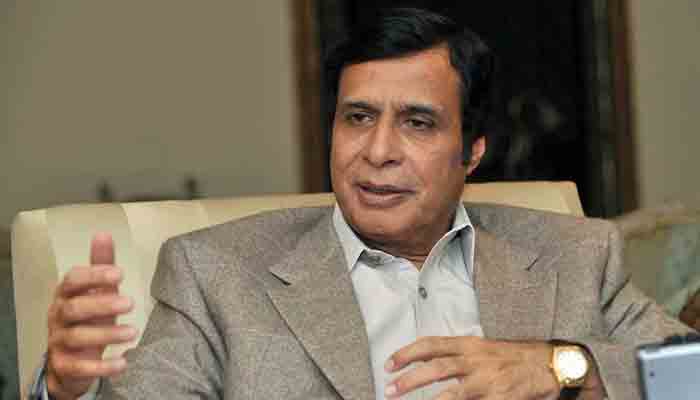Pervez Elahi is down but not out
Pervez Elahi sent references against the defectors, which have been received by the ECP
ISLAMABAD: Pakistan Tehreek-e-Insaf (PTI) aims to give another surprise and this time in the Punjab Assembly as it attempts to expedite the process of de-seating through the Election Commission of Pakistan (ECP) of its 26 MPAs who went against the party line by voting for Hamza Shehbaz Sharif.
Speaker Punjab Assembly Chaudhry Pervez Elahi sent references against the defectors, which have been received by the ECP. Efforts are afoot to press on the ECP to de-seat those 26 provincial lawmakers not later than April 28 when the session of the assembly has been called. In case they are de-seated, new elections for the chief minister would have to be called in.
In that case no one would be having simple majority of 186 in the 371-strong Punjab Assembly, so the new elections would have to be called for.This move has sparked panic among the defectors as their future is at stake. Different legal courses of action are under consideration to deal with this impending crisis. One of them, for example, is to challenge this move in the Lahore High Court on the grounds that the due process has not been followed, like the reply from the MPAs served with show cause.
It also remains to be decided whether Pervez Elahi could send the references to the ECP or not. According to the relevant clause of the Constitution, the presiding officer can submit the references and in the case under question, the deputy speaker held this position on the day the voting occurred and defection took place as defined in the Constitution of Pakistan.
Procedure of disqualification through defection has been explained in Article 63-A of the Constitution of Pakistan. It reads: “If a member of a parliamentary party composed of a single political party in a House (a) resigns from membership of his political party or join another [one]; or (b) votes or abstains from voting in the House contrary to any direction issued by the parliamentary to which he belongs, in relation to – (i) election of the Prime Minister of the Chief Minister; or (ii) a vote of confidence or a vote of no-confidence; or (iii) a money bill or a Constitution (Amendment) Bill; he may be declared in from membership of his political party or join another [one]; or (b) votes or abstains from voting in the House contrary to any direction issued by the parliamentary to which he belongs, in relation to – (i) election of the Prime Minister of the Chief Minister; or (ii) a vote of confidence or a vote of no-confidence; or (iii) a money bill or a Constitution (Amendment) Bill; he may be declared in writing by the party head to have defected from the political party and the party head may forward a copy of the deceleration to the presiding officer and the chief election commissioner and shall similarly forward a copy thereof to the member concerned; provided that before making the declaration, the party head shall provide such member with an opportunity to show cause as to why such declaration may not be made against him.”
-
 Funeral Home Owner Sentenced To 40 Years For Selling Corpses, Faking Ashes
Funeral Home Owner Sentenced To 40 Years For Selling Corpses, Faking Ashes -
 Why Is Thor Portrayed Differently In Marvel Movies?
Why Is Thor Portrayed Differently In Marvel Movies? -
 Dutch Seismologist Hints At 'surprise’ Quake In Coming Days
Dutch Seismologist Hints At 'surprise’ Quake In Coming Days -
 Australia’s Liberal-National Coalition Reunites After Brief Split Over Hate Laws
Australia’s Liberal-National Coalition Reunites After Brief Split Over Hate Laws -
 DC Director Gives Hopeful Message As Questions Raised Over 'Blue Beetle's Future
DC Director Gives Hopeful Message As Questions Raised Over 'Blue Beetle's Future -
 King Charles New Plans For Andrew In Norfolk Exposed
King Charles New Plans For Andrew In Norfolk Exposed -
 What You Need To Know About Ischemic Stroke
What You Need To Know About Ischemic Stroke -
 Shocking Reason Behind Type 2 Diabetes Revealed By Scientists
Shocking Reason Behind Type 2 Diabetes Revealed By Scientists -
 SpaceX Cleared For NASA Crew-12 Launch After Falcon 9 Review
SpaceX Cleared For NASA Crew-12 Launch After Falcon 9 Review -
 Meghan Markle Gives Old Hollywood Vibes In New Photos At Glitzy Event
Meghan Markle Gives Old Hollywood Vibes In New Photos At Glitzy Event -
 Simple 'finger Test' Unveils Lung Cancer Diagnosis
Simple 'finger Test' Unveils Lung Cancer Diagnosis -
 Groundbreaking Treatment For Sepsis Emerges In New Study
Groundbreaking Treatment For Sepsis Emerges In New Study -
 Roblox Blocked In Egypt Sparks Debate Over Child Safety And Digital Access
Roblox Blocked In Egypt Sparks Debate Over Child Safety And Digital Access -
 Savannah Guthrie Addresses Ransom Demands Made By Her Mother Nancy's Kidnappers
Savannah Guthrie Addresses Ransom Demands Made By Her Mother Nancy's Kidnappers -
 OpenAI Reportedly Working On AI-powered Earbuds As First Hardware Product
OpenAI Reportedly Working On AI-powered Earbuds As First Hardware Product -
 Andrew, Sarah Ferguson Refuse King Charles Request: 'Raising Eyebrows Inside Palace'
Andrew, Sarah Ferguson Refuse King Charles Request: 'Raising Eyebrows Inside Palace'




